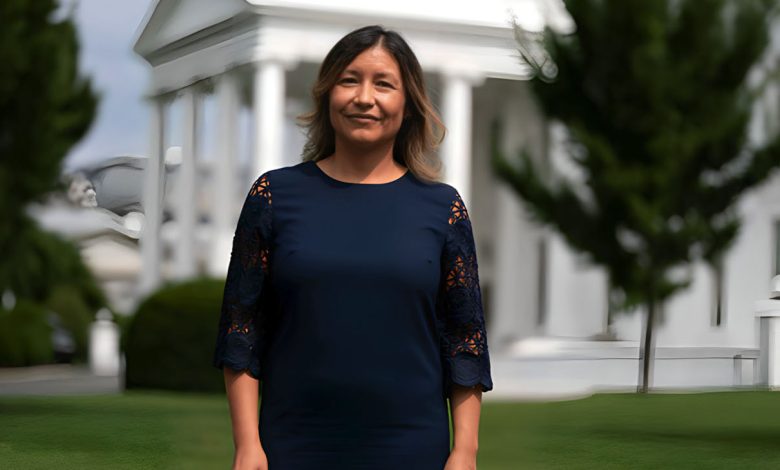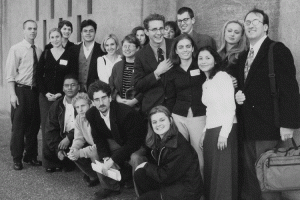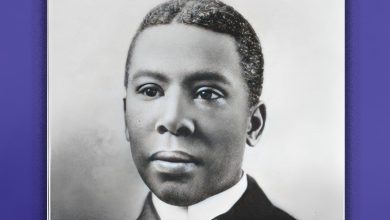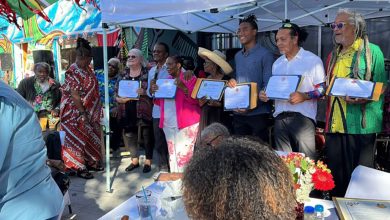Julie Chavez Rodriguez, ‘Visionary’ Berkeley Grad, to Run Biden Campaign

By Edward Lempinen
Twenty-five years ago, UC Berkeley Professor Harley Shaiken could not know the future that awaited undergraduate Julie Chavez Rodriguez. But even then, he was struck by her talent, deep commitment to social justice and modesty — and that was before he knew that she was the granddaughter of César Chávez, the iconic American labor organizer and civil rights leader.
Now, President Joe Biden has named Chavez Rodriguez to lead his 2024 reelection campaign, and Shaiken sees how a student’s promise has grown into national influence.
“Julie understood the realities in which we live — the lack of opportunities for so many people of color and poor white people, and particularly Latinos, particularly Black people and immigrants,” Shaiken said yesterday. “But she saw a better world and was willing to work tirelessly…. She had this moral sensibility and this conviction to see these things happen, that have always been impressive.”

As an undergraduate, Julie Chavez Rodriguez (third from right, in a white sweater) helped to organize a high-level conference at the UC Berkeley Center for Latin American Studies. She distinguished herself through her idealism, her commitment and her hard work, said Harley Shaiken, former chair of the center. (Photo courtesy of the UC Berkeley Center for Latin American Studies)
When Biden formally opened his campaign to win reelection in 2024, Chavez Rodriguez, 45, became the first Latinx woman in U.S. history to run the campaign of an incumbent president. In comments at his announcement on April 25, the president cited her experience and leadership, and the trust she has built across political communities.
“This election is a generational moment for Americans across the country to stand up and fight for our democracy and freedoms,” Biden said. “To win this fight, we need strong leadership that can build and expand our broad, diverse coalition from 2020.”
Chavez Rodriguez graduated from Berkeley in 2000 with a degree in Latin American studies, and the arc of her career since then has been remarkable. She volunteered with the first presidential campaign of Barack Obama in 2008, and then was hired into the administration.
She worked as deputy press secretary to Interior Secretary Ken Salazar, and later as special assistant to Obama and as senior deputy director of public engagement in the White House. In that role, she built high-level networks across a range of communities: LGBTQ, Asian American Pacific Islander, Latinx, veterans, youth, and labor.
After Obama left office, Chavez Rodriguez joined the staff of then-U.S. Senator Kamala Harris of California, serving as California state director. When Harris ran for president, Chavez Rodriguez held a leadership post in her campaign, and then joined the Biden-Harris 2020 campaign as deputy campaign manager.
After Biden’s victory, she was one of a number of advisers with Berkeley connections to join the administration. She served as a senior adviser to the president and as director of the White House Office of Intergovernmental Affairs.
A lifetime of commitment, starting in childhood
In practical terms, however, Chavez Rodriguez’s career was directly shaped in her childhood.
Her grandfather came from an impoverished family of farmworkers; he would go on to be a labor organizer of historic importance and global impact.
Her father, Arturo S. Rodríguez, worked 45 years with the United Farm Workers of America, including 25 as the union’s president. Her mother, Linda Chavez Rodriguez, also was a major UFW figure before her death in October 2000.
At the age of 9, Julie Chavez Rodriguez and others in her family were arrested while demonstrating at a New Jersey supermarket. When she was 10, her grandfather went on a 36-day hunger strike to protest the use of pesticides on table grapes, and she joined his action for three days.
‘Social justice is not an abstraction to her’
Shaiken met her in 1998, when he was chair of Berkeley’s Center for Latin American Studies (CLAS). As an undergraduate, she had volunteered to help organize a CLAS conference that would explore economic integration, globalization and the future of U.S. and Latin American relations.
The event featured former California Gov. Jerry Brown, then mayor-elect of Oakland, along with a cadre of rising stars: future Mexican President Vicente Fox, future U.S. House Speaker Nancy Pelosi, Adolfo Aguilar Zínser, who would serve as Mexico’s ambassador to the United Nations, and Sherrod Brown, who would become a U.S. senator from Ohio.
At the time, and for weeks afterward, Shaiken had no clue about her family background — she wanted to stand on her own, he recalled, and while she was deeply proud of her family, she didn’t mention them initially. Instead, he saw her idealism and her hard work.
“All I knew was that she was Julie Chavez Rodriguez,” he said. “She had a deep concern for other people, including the most marginalized and desperate people. But she was understated and open — she stood out not by being flashy, but by her deep social commitment, her courage, and her values…. She was a visionary.”
Shaiken, now a professor emeritus of geography and education, has stayed in touch with Chavez Rodriguez and followed her career, and he believes that her experience and her networks will be critical assets to Biden. Her idealism is now complemented by the pragmatism of experience, he said. Her knowledge of Latinx culture and politics could be essential in what may be a close contest with former President Donald Trump or another Republican nominee.
“She’ll face countless headwinds and storms — we know that,” Shaiken said. “But she’s a person who’s steady under fire and comes from a background where people did great things under the worst of circumstances.
“Social justice is not an abstraction to her. It is her North Star.”





